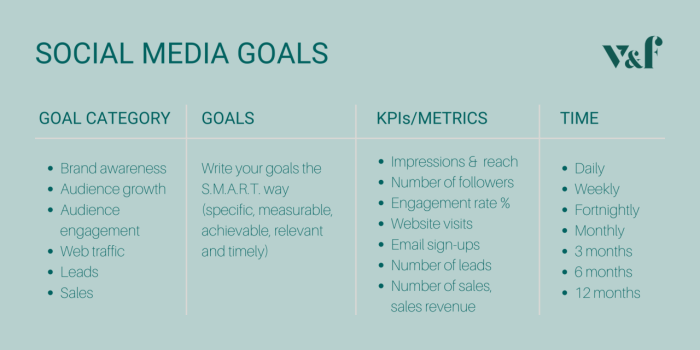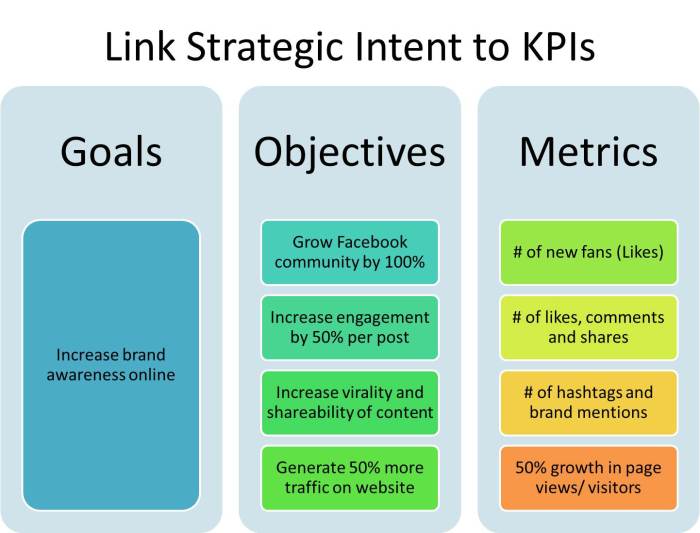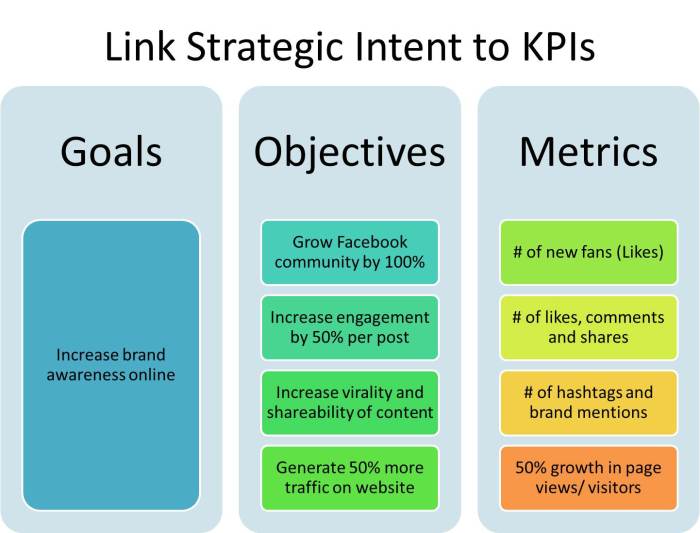Setting Social Media Goals is like mapping out your online journey to success, ensuring you stay on the right track and reach your destination. It’s a crucial step in the world of digital marketing that can make or break your online presence.
From defining your objectives to measuring your progress, this guide will equip you with the knowledge and tools needed to navigate the social media landscape with confidence.
Importance of Setting Social Media Goals
Setting social media goals is crucial for businesses to have a clear direction and purpose for their online presence. Without specific goals in place, companies may struggle to measure the success of their social media efforts and may not be able to effectively track their progress.
Types of Social Media Goals, Setting Social Media Goals
- Increasing brand awareness: Companies often set goals to reach a certain number of followers or increase their online visibility through shares and likes.
- Driving website traffic: Goals may focus on directing social media followers to the company website to generate leads or sales.
- Engagement metrics: Metrics such as likes, comments, and shares can help measure how well social media content is resonating with the audience.
- Lead generation: Companies may set goals to capture leads through social media platforms by offering downloadable content or promotions.
Setting these goals helps businesses to track their progress, adjust their strategies as needed, and ultimately determine the return on investment of their social media efforts.
Types of Social Media Goals
In the realm of social media, it is essential to establish clear goals to guide your efforts in achieving success. Different categories of social media goals serve specific purposes and help businesses grow their online presence effectively.
Brand Awareness
Brand awareness goals focus on increasing visibility and recognition of your brand among your target audience. This type of goal aims to enhance the familiarity of your brand in the minds of consumers, ultimately leading to increased brand loyalty and trust. Strategies for brand awareness goals may include creating engaging content, running targeted ad campaigns, and collaborating with influencers.
Lead Generation
Lead generation goals involve capturing potential customers’ interest and turning them into leads for your business. This type of goal aims to increase the number of prospects in your sales pipeline, ultimately leading to higher conversion rates and revenue generation. Strategies for lead generation goals may include offering valuable content, implementing lead magnets, and optimizing landing pages for conversions.
Customer Engagement
Customer engagement goals focus on fostering meaningful interactions with your audience and building relationships with them. This type of goal aims to increase customer satisfaction, loyalty, and advocacy for your brand. Strategies for customer engagement goals may include responding to comments and messages promptly, running interactive campaigns, and creating a community around your brand.
Short-term Goals vs. Long-term Goals
Short-term goals in social media typically focus on achieving immediate results, such as increasing website traffic, boosting engagement metrics, or running a time-limited campaign. On the other hand, long-term goals involve building a sustainable online presence, establishing brand authority, and nurturing long-lasting relationships with your audience over time. While short-term goals provide quick wins, long-term goals ensure the longevity and growth of your social media efforts.
Strategies for Setting Effective Social Media Goals

Setting social media goals that align with overall business objectives is crucial for a successful digital marketing strategy. By ensuring that your social media goals are in line with your broader business goals, you can maximize the impact of your online presence and drive meaningful results.
Aligning Social Media Goals with Business Objectives
- Identify key business objectives: Before setting social media goals, it’s essential to understand the primary goals of your business. Whether it’s increasing brand awareness, driving sales, or improving customer engagement, your social media goals should directly contribute to these objectives.
- Map out a strategy: Develop a clear strategy that Artikels how your social media efforts will support your business goals. This could include specific campaigns, content plans, or engagement tactics that align with your overall objectives.
- Measure impact: Regularly track and measure the performance of your social media efforts against your business objectives. This data will help you refine your strategy and ensure that your goals remain aligned with the broader goals of your organization.
The SMART Criteria for Setting Goals
- Specific: Goals should be clearly defined and specific, leaving no room for ambiguity. For example, “Increase Instagram followers by 20% in the next quarter.”
- Measurable: Goals should be quantifiable so that progress can be tracked and measured. This allows you to assess the success of your efforts and make data-driven decisions.
- Achievable: Goals should be realistic and attainable within the resources and constraints of your business. Setting overly ambitious goals can lead to frustration and burnout.
- Relevant: Goals should be relevant to your business objectives and align with the needs of your target audience. Ensure that your social media goals are meaningful and contribute to overall success.
- Time-bound: Goals should have a specific timeline for completion, providing a sense of urgency and accountability. This helps prioritize tasks and maintain focus on achieving objectives within a set timeframe.
Examples of Actionable Goals
- Increase website traffic from social media by 25% in the next six months.
- Generate 100 leads from Facebook ads within the next quarter.
- Boost engagement on Twitter by 15% over the next month through interactive content.
Metrics for Monitoring Social Media Goals

In the world of social media marketing, tracking the progress of your goals is crucial to achieving success. By analyzing key metrics, you can gain valuable insights into the effectiveness of your strategies and make necessary adjustments to optimize your campaigns.
Engagement Metrics
- Likes, comments, shares: These metrics indicate how well your content is resonating with your audience. Higher engagement levels typically mean your content is relevant and valuable to your followers.
- Click-through rate (CTR): This metric measures the percentage of people who clicked on a link in your post. A high CTR shows that your content is compelling and driving traffic to your website.
- Replies and mentions: Monitoring replies and mentions can help you gauge how well you are engaging with your audience and address any questions or concerns they may have.
Reach Metrics
- Impressions: The total number of times your content is displayed on social media platforms. It gives you an idea of how many people have seen your posts.
- Reach: The number of unique users who have seen your content. It helps you understand the size of your potential audience and how effectively you are expanding your reach.
- Follower growth rate: Tracking the growth of your follower count over time can indicate the popularity of your brand and the success of your social media efforts.
Conversion Metrics
- Conversion rate: The percentage of users who take a desired action, such as making a purchase or signing up for a newsletter. This metric directly ties social media efforts to tangible results.
- Lead generation: Tracking the number of leads generated through social media campaigns can help you assess the effectiveness of your lead generation strategies.
- Sales revenue: Monitoring the revenue generated from social media marketing activities can help you determine the return on investment and adjust your strategies accordingly.
